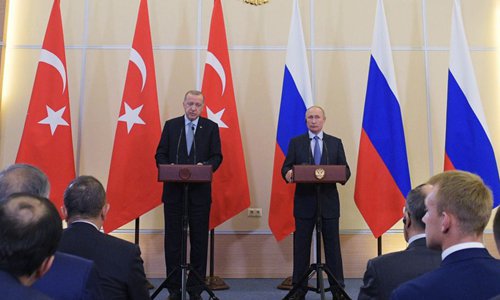HOME >> OPINION
Russia plays long game in the Middle East
By Niu Xinchun Source:Global Times Published: 2019/10/28 21:28:40

Russian President Vladimir Putin and Turkish President Recep Tayyip Erdogan attend a joint news conference following their meeting in Sochi, Russia, on October 22. Photo: Sputnik via Xinhua
When Turkey's ceasefire agreement with Kurdish forces was set to expire, Turkish President Recep Tayyip Erdogan made a surprise visit to Russia on October 22 and reached a separate agreement with Russian President Vladimir Putin.According to media reports, the agreement will see Turkish and Russian military and police forces patrolling the northern border of Syria. Turkey also agreed to respect the integrity of Syrian territory. It was an agreement that met the needs of all parties.
Meanwhile, US troops pulled out of northern Syria, a move that received criticism from all sides. In contrast, it appears the influence of Russia is ascending as the US' declines regarding Middle East affairs. Russia's presence and influence in the Middle East are of a limited, regional, and tactical nature, as the gap between Russia and the US remains large.
The US and Russia are far from transposed in the Middle East, but step by step, Russia seems to have an approach to carry out its regional strategy.
First, the Syrian civil war has provided Russia a foothold to return to the Middle East. During the Cold War, the US and the Soviet Union divided the Middle East, and the latter's regional influence was superior.
Following the Cold War, Russia gradually withdrew from the Middle East. In 2015, Russia became biggest player in Syria after sending troops to the region where it helped secure Syrian President Bashar al-Assad's government.
With Syria as its fulcrum, Russia has maneuvered relations with Iran, Turkey, Israel, Iraq and other Middle Eastern players, marking a return to the region's strategic center.
Second, the contraction of US forces in the Middle East has granted Russia the opportunity and space to reclaim the influence.
In recent months, the US has not implemented effective countermeasures after one of its drones was shot down by Iran in June and the Saudi Arabia's oil facilities were attacked in September. US reliability has become a pressing issue for most US allies to confirm.
US traditional allies like Israel, Saudi Arabia, the United Arab Emirates, and Egypt, have started to search for a new partner by turning to Russia.
Third, Russia's strategy is in accordance with the Middle East situation. Russian forces have established cooperative relations with the countries in the region and do not take sides on most issues.
Moscow's high-profile interventions on regional conflicts have been aimed at promoting peace talks rather than providing substantial interference. Now, Russian delegation can be seen on every negotiating table in the Middle East.
Because Russia's strategic goal in the region is down-to-earth, it has worked well so far. After the Islamic State's basement was eradicated, Russia prevented extreme force from entering its territory. Russia has also preserved its sole military base in the region after the Assad government regained power.
After consolidating cooperative relations with major Middle Eastern countries, Russia partially broke through the US economic siege, and gained business interests by signing economic and arms sales contracts with Turkey, Saudi Arabia, and Egypt.
The US is implementing a strategic contraction while Russia has only limited goals in the region, hence there is no so-called strategic game between Moscow and Washington.
In fact, it is not the US, but Russia's own capability that restricts its Middle East involvement. In terms of national strength, Russia's GDP in 2018 was about $1.63 trillion, ranking 11th in the world, which cannot support a global power strategy.
Russia's annual military budget is less than a tenth of the US'.
Russia and the Middle Eastern markets have weak complementarities but a strong competition in the region. In 2017, Russia's trade volume with the entire region was only $45.5 billion, among which $21.6 billion was with Turkey. It is obvious that Russia does not have major economic interests in the region.
Russia's return is real, but the goal is restrained and the action is cautious. At present, Russia is at the stage of accumulating strength in the Middle East, which is unlikely to reshape the region's long-term security structure.
The author is a research fellow at the China Institutes of Contemporary International Relations. opinion@globaltimes.com.cn
Posted in: VIEWPOINT